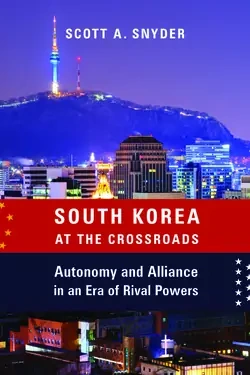
South Korea at the Crossroads
Autonomy and Alliance in an Era of Rival Powers

An authoritative look at South Korea's foreign-policy choices in an increasingly uncertain Asia.
- Book
- Foreign policy analyses written by CFR fellows and published by the trade presses, academic presses, or the Council on Foreign Relations Press.
Read an excerpt from South Korea at the Crossroads.
In a new preface to the paperback edition, Snyder observes that the enduring tension between the desire for autonomy and the need for alliance remains central as the Moon Jae-in administration attempts to navigate South Korea’s path forward amid rising regional rivalry.
More on:
“South Korea’s only viable strategic option for the foreseeable future is continued cultivation and strengthening of the alliance with the United States,” argues Scott A. Snyder in South Korea at the Crossroads: Autonomy and Alliance in an Era of Rival Powers.
“Despite China’s rising economic and political influence in East Asia, the United States remains the country that is most capable, committed, and strategically aligned with South Korea,” writes Snyder, Council on Foreign Relations senior fellow for Korea studies and director of the program on U.S.-Korea Policy.
“A major factor influencing South Korea’s strategic choices is the relative balance of power between China and the United States,” he writes. “Korea’s historic preference has been to accommodate the country with the greatest influence on Korea while seeking to preserve Korea’s security and sovereignty.”
He notes that after China surpassed the United States as South Korea’s number one economic partner in 2004, the “divergence between South Korea’s economic opportunities with China and the security alliance with the United States began to draw attention in South Korean policy circles.”
According to Snyder, the United States “shares democratic values with South Korea” and “remains more powerful than China and continues to guarantee an open and liberal global order under which South Korea as a leading exporter has thrived.”
More on:
Snyder contends that as long as U.S. defense commitments remain credible and the United States remains the most powerful actor in global affairs, “the U.S.-ROK [Republic of Korea] alliance will remain the anchor and platform that enables South Korea’s pursuit of its fundamental strategic objectives” of security, prosperity, and national unification.
A Council on Foreign Relations Book
Educators: Access Teaching Notes for South Korea at the Crossroads.
 Online Store
Online Store